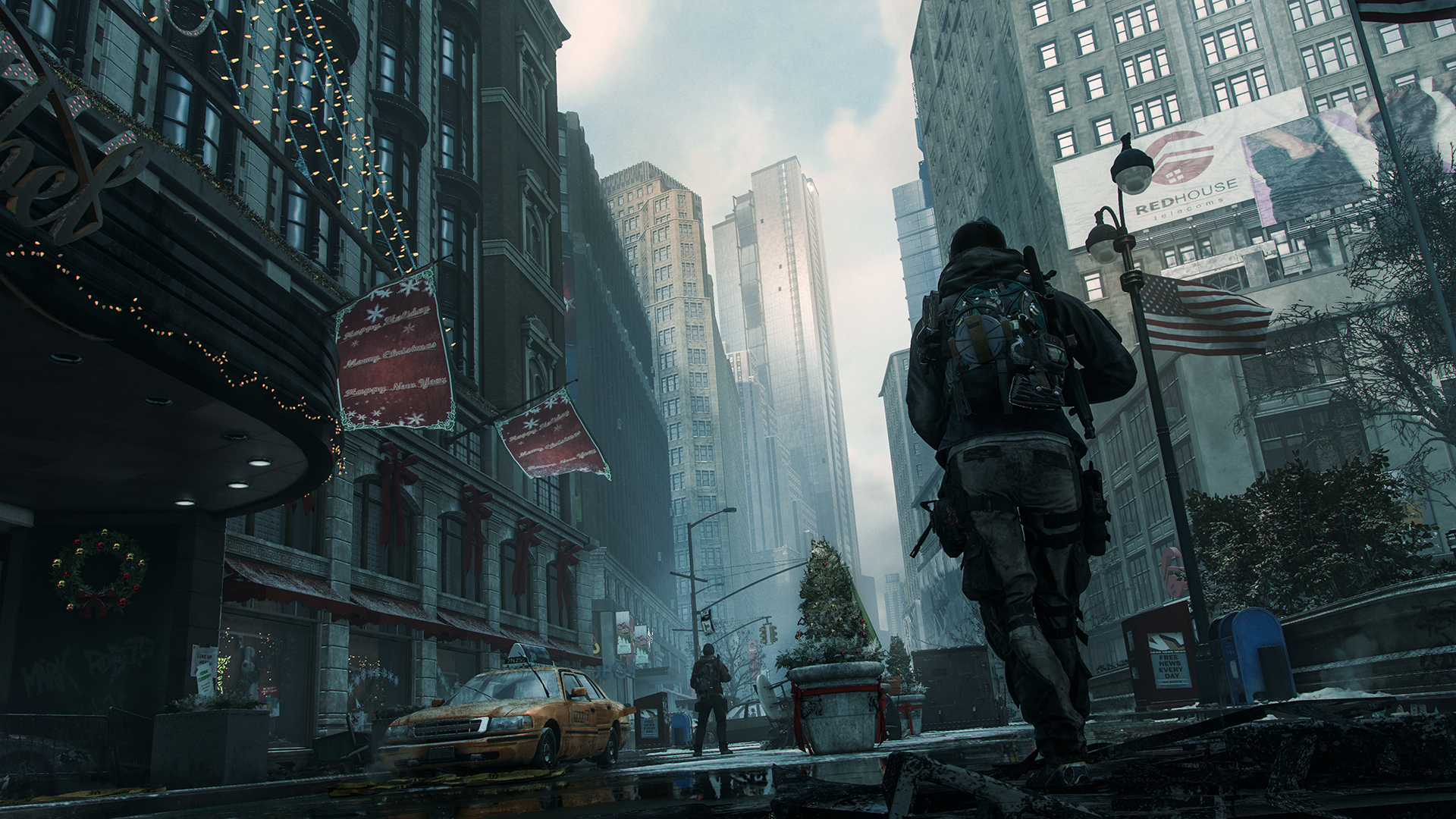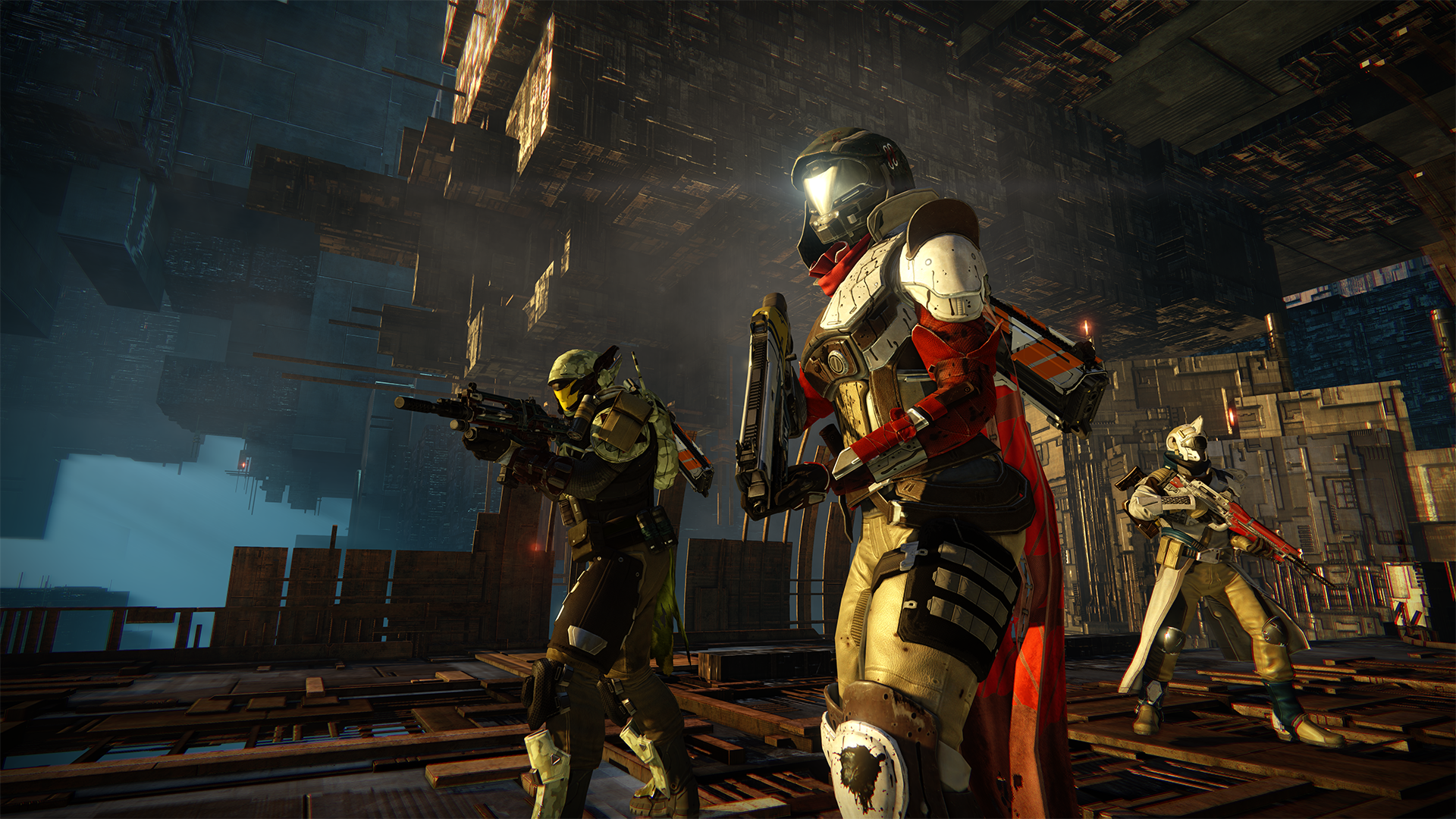Why The Division isn't Destiny for the PC

Having sunk twenty-some hours into The Division over the last week, my feelings closely mirror those of our reviewer, James. Ubisoft's looter-shooting shoot-n'-loot is beautiful, and has the fundamentals of a tactical action game down, but it's repetitive and shallow to a fault. I've already stopped feeling the pull to keep playing: there are only so many waterproof parkas I need, really, so many variants on exactly the same gun with bigger numbers attached.
The thing is, I remember the last time a high-profile hybrid shooter-MMO was released to average reviews—and in that case, I strongly disagreed. Bungie's sadly console-locked Destiny is one of my favourite games of the last couple of years, despite suffering from some of the same problems as The Division at launch (and despite having struggled immensely to hold the attention of its players over the last couple of months.)
Destiny's latter-day problems and the game's continued absence from the PC encouraged many, myself included, to wonder if The Division could step in to fill a couple of gaps at at once. The short answer to that question turns out to be 'no', at least for me. The long answer says something about shooters, MMOs, reward loops and licensed games.
The Division is a 'Skinner box' in much the same way that Destiny is, or that Diablo III is, or that World of Warcraft is. It drills into the part of your brain that wants to hunt and gather. Play for an hour and you'll have an inventory full of new items to sort through, base resources to invest, money to spend, perks to pick. Then you head back out, clear out some more minimap icons, shoot some more men in hoodies, and repeat.
If Destiny had no progression system at all, it'd still be a best-in-class FPS
There's nothing wrong with a loop like this, in and of itself. It's a way to get a player to invest more time than they otherwise would—a way, to paraphrase James, to turn an 8-hour co-op shooter into 30+ hour RPG. From a quality perspective, however, Skinner box systems place an enormous amount of pressure on the game mechanics that feed into them. If they're not substantial enough, you may as well be playing Candy Crush.
This is why it doesn't matter that Destiny is a Skinner box, but it does matter that The Division is. Above all else, Bungie made a fundamentally accomplished shooter. Destiny has had balance problems, but these stem from the rich and systems-driven combat system driving the game. First you have weaponry that fit into meaningfully diverse archetypes, that feel good to fire, that have behaviours that can be exploited by skilled players. Then you have diverse opponents—both player an AI—that force you to adapt and consider different uses for your arsenal.
If Destiny had no progression system at all, it'd still be a best-in-class FPS—and, happily, its gear system enhances this. While you can play solely for the dopamine hit of getting a drop, you'll hopefully be more excited about what that drop represents. The most pertinent examples of this are Destiny's exotic weapons, which have unique capabilities that challenge their archetype. This has led to cults of personality around specific, named guns—like the impossible-to-use-unless-you're-awesome bolt-action sniper No Land Beyond, or the (much, much larger) cult surrounding Thorn at the peak of its popularity.
The biggest gaming news, reviews and hardware deals
Keep up to date with the most important stories and the best deals, as picked by the PC Gamer team.
Then you've got the way perks are incorporated into randomly-generated weapons, where percentage increases in damage or stability are secondary to playstyle-altering shifts like rounds that detonate on a headshot kill or the reload-discouraging Final Round, which grants you bonus damage on the lower half of the clip.

These systems are great because they actively encourage creativity and investment in their players. They encourage a metagame to develop and for people to become passionate about it. They turn the game into a series of interesting decisions, as Sid Meier once said. A battle with a robot demigod that splits the party across three dimensions is exciting in and of itself, but its impact is built on the simple but vital basic successes of the combat system—and the loot you may or may not get at the end is a bonus that keeps you playing, not the only reason to play at all.
In short: if Destiny's skinner box is a trick, it's tricking you into playing a good game.
I don't think The Division is there yet, and I'm not sure how it gets there. Weapons do diverge from one another, but they diverge along narrow lines defined by what real firearms can be. As you level up you unlock a range of abilities, but I'm yet to feel excited (or compelled to theorycraft) around 3% boosts to critical hit damage or the ability to slightly mitigate damage in an area around a magic briefcase.
The moment when you pop a Cleaner's fuel tank is exciting, but it plays out the same way every time. Using a turret to draw enemy fire feels clever the first time, then turns into a degenerate interaction with the AI that becomes an essential exploit as the difficulty level ramps up. You can't jump. You can't crouch in the open. You can't take cover unless the game agrees with you about what 'cover' entails. The Division is rigid and bone-dry, mechanically, and while this would be fine for a shorter game it's not enough to justify the investment-prolonging reward loop stacked on top of it.
it's really about an incredibly reward-oriented person in a beanie fighting a giant evil bulletproof fireman
This would be a serious issue normally, but it's rendered crippling by the restrictive confines of The Division's fiction. This is a Clancy game. It's set in New York, just about in the modern day, and it's already trying as hard as it can to gloss over a loot system where one set of kevlar kneepads might boost your electronics while another boots your firearms. It's definitely an RPG, but it doesn't really want to be: it wants to tell you a story about undercover operatives fighting in a post-disaster wasteland, but it's really about an incredibly reward-oriented person in a beanie fighting a giant evil bulletproof fireman.
You're not going to get meaningful diversity from M4A1s and AK-47s. You're not going to get it from enemies who can only be regular people. And you're not going to get it from gadgets and abilities that stem from the question 'what if Google Glass could help you kill people'. Raid-style encounters are on the way, as is a horde mode, but I can't see this saving The Division unless somehow Ubisoft find a way of adding depth and variety to the game and its gear—and I can't see how they do that without breaking from the basic tenets of the setting. Perhaps they will. Perhaps one day we'll be thinking 'man, they really saved The Division when they added mechs'. But I doubt it.
To take the comparision in a different direction, DayZ eked meaningful variety out of a modern setting by committing to realism and its punishing consequences. Rainbow Six: Siege did too, for that matter, a far better and richer use of the Clancy name that doesn't deserve to be eclipsed by The Division's commercial success. Destiny, meanwhile, drew meaningful variety out of the MMO formula by leveraging the freedoms of a new sci-fi setting and respecting the challenge of building a shooter for the long term. The Division sits in the awkward middle ground between these extremes, held back from both success and outright failure by Ubisoft's template-driven approach to game design. The game is fine—and fine is fine for eight hours, but not for eighty.
Joining in 2011, Chris made his start with PC Gamer turning beautiful trees into magazines, first as a writer and later as deputy editor. Once PCG's reluctant MMO champion , his discovery of Dota 2 in 2012 led him to much darker, stranger places. In 2015, Chris became the editor of PC Gamer Pro, overseeing our online coverage of competitive gaming and esports. He left in 2017, and can be now found making games and recording the Crate & Crowbar podcast.


